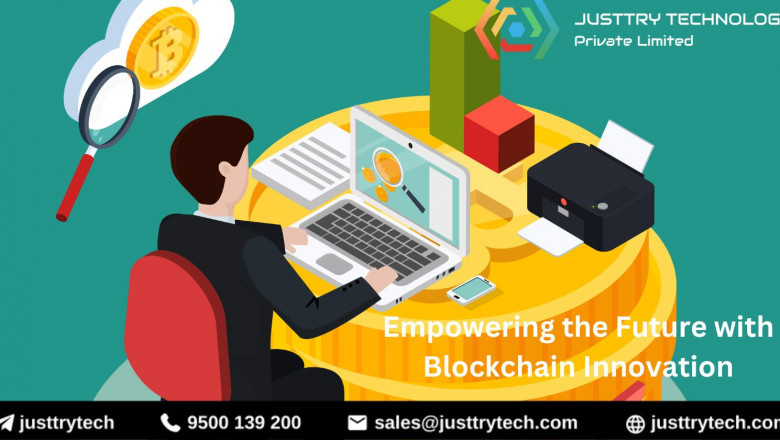views
Essential Skills for Aspiring Blockchain Developers: A Comprehensive Guide
The demand for blockchain developers has skyrocketed as industries continue to embrace blockchain technology to create secure, decentralized solutions. From cryptocurrency platforms to enterprise-grade systems, blockchain development offers a wealth of opportunities for professionals looking to make their mark in this transformative field.
But before diving into a career in blockchain development, it’s important to understand the skills you’ll need to succeed. In this guide, we’ll explore the must-have skills for blockchain developers, whether you’re starting fresh or enhancing your expertise with the help of professional blockchain development services.
Why Blockchain Development is a Hot Career Path
Blockchain is no longer just about cryptocurrencies like Bitcoin and Ethereum. It’s now a core technology driving innovation in industries such as finance, healthcare, supply chain, and gaming.
Key Benefits of Becoming a Blockchain Developer:
-
High Demand: Companies across sectors are seeking skilled blockchain developers.
-
Lucrative Salaries: With limited talent in the market, blockchain developers often command premium compensation.
-
Diverse Applications: Work on exciting projects in DeFi, NFTs, smart contracts, and more.
-
Cutting-Edge Technology: Be part of the team shaping the future of the digital economy.
Top Skills Every Blockchain Developer Needs
1. Strong Understanding of Blockchain Basics
Before diving into development, it’s essential to grasp the core concepts of blockchain technology.
-
Key Concepts to Master:
-
Distributed ledger systems.
-
Decentralization and immutability.
-
Blockchain consensus mechanisms like Proof of Work (PoW) and Proof of Stake (PoS).
-
Cryptographic principles, including hashing and encryption.
-
How It Helps:
A solid foundation ensures you can understand how blockchain works and its potential applications across industries.
2. Proficiency in Programming Languages
Blockchain developers must be proficient in specific programming languages used for blockchain development.
-
Key Languages to Learn:
-
Solidity: The primary language for Ethereum smart contracts.
-
Rust: Popular for Solana blockchain development.
-
Go (Golang): Used in Hyperledger Fabric and enterprise-grade solutions.
-
Python: Ideal for scripting and blockchain application development.
-
JavaScript: Useful for building decentralized applications (dApps).
-
How It Helps:
Programming skills enable you to design, develop, and deploy blockchain solutions tailored to client or business needs.
3. Smart Contract Development
Smart contracts are the backbone of blockchain-based applications. These self-executing codes automate transactions and processes without intermediaries.
-
Skills to Master:
-
Writing secure and efficient smart contracts using Solidity or Vyper.
-
Testing and debugging smart contracts with tools like Truffle or Hardhat.
-
Understanding gas optimization to reduce costs on blockchain networks.
-
How It Helps:
Mastery of smart contracts allows you to build innovative dApps, DeFi platforms, and NFT marketplaces.
4. Familiarity with Blockchain Platforms
Each blockchain network has its unique features, protocols, and tools.
-
Popular Blockchain Platforms:
-
Ethereum: The most widely used platform for smart contracts and dApps.
-
Binance Smart Chain (BSC): Known for low transaction fees and scalability.
-
Solana: A high-performance blockchain for decentralized applications.
-
Hyperledger Fabric: An enterprise-grade blockchain for private networks.
-
How It Helps:
Familiarity with multiple platforms allows you to choose the right one for specific projects and client requirements.
5. Knowledge of Decentralized Application (dApp) Development
Decentralized applications (dApps) run on blockchain networks and offer various functionalities, from DeFi platforms to NFT marketplaces.
-
Key Skills for dApp Development:
-
Front-end development with frameworks like React.js or Angular.
-
Integration of smart contracts with the front-end using libraries like Web3.js or Ether.js.
-
Understanding of blockchain APIs for real-time data access.
-
How It Helps:
dApp development skills are essential for creating user-facing applications that harness blockchain’s power.
6. Understanding of Cryptography
Blockchain relies heavily on cryptographic algorithms to secure transactions and data.
-
Core Concepts to Learn:
-
Public and private key encryption.
-
Hash functions like SHA-256.
-
Digital signatures for transaction verification.
-
How It Helps:
Cryptography skills are critical for building secure blockchain applications and protecting sensitive data.
7. Problem-Solving and Analytical Thinking
Blockchain development often involves solving complex problems, such as scalability and security challenges.
-
What to Focus On:
-
Debugging and optimizing smart contracts.
-
Identifying and mitigating blockchain vulnerabilities.
-
Designing solutions for real-world use cases like supply chain or payment systems.
-
How It Helps:
Strong problem-solving skills help you build innovative and reliable blockchain solutions.
8. Collaboration and Teamwork
Blockchain projects often involve cross-functional teams, including developers, designers, and business analysts.
-
Soft Skills to Develop:
-
Effective communication for collaborating on project goals.
-
Adaptability to work with diverse team members and tools.
-
How It Helps:
Collaboration ensures successful project delivery and integration of blockchain solutions.
Leveraging Blockchain Development Services
For businesses, hiring a professional blockchain development service can streamline the process of building blockchain-based applications. These services offer expertise in:
-
Developing secure and scalable blockchain platforms.
-
Designing and deploying smart contracts and dApps.
-
Customizing solutions for industry-specific use cases, from DeFi to supply chain management.
-
Providing ongoing maintenance and updates to ensure smooth operation.
How to Start Your Blockchain Development Journey
-
Learn the Basics: Start with online courses, tutorials, and certifications on blockchain fundamentals.
-
Practice Programming: Build small projects using languages like Solidity or Python.
-
Experiment with Tools: Use development tools like Truffle, Remix, and Ganache to practice smart contract deployment.
-
Stay Updated






















Comments
0 comment